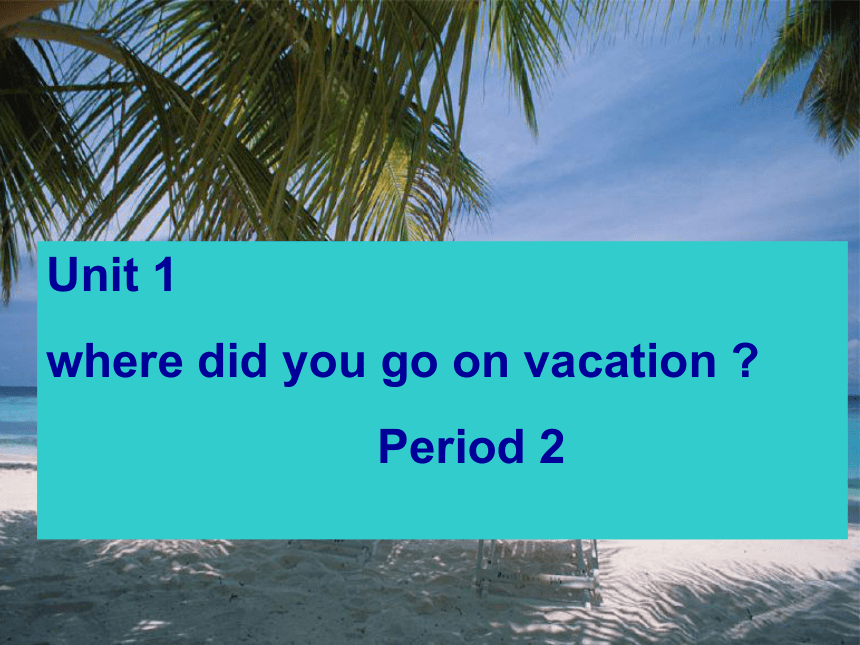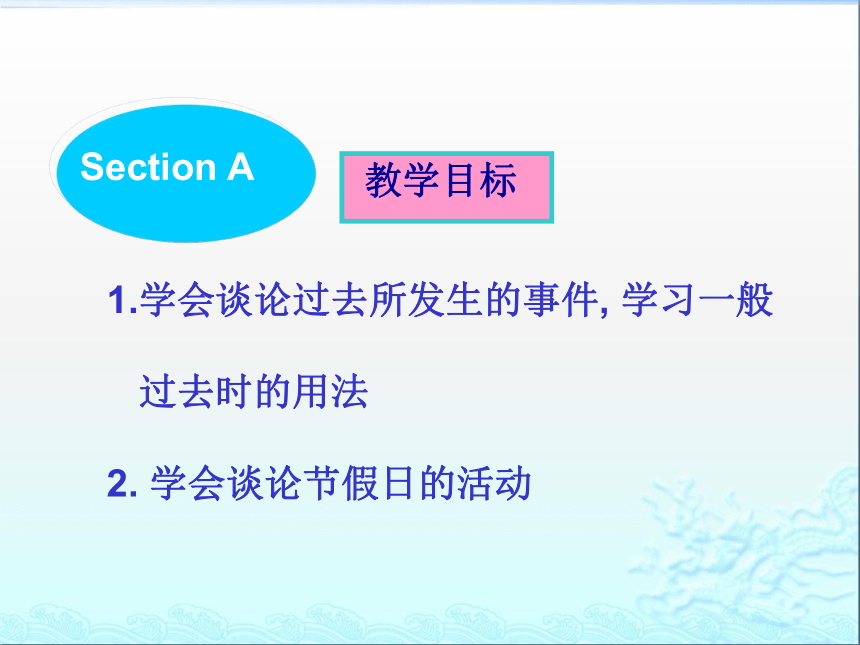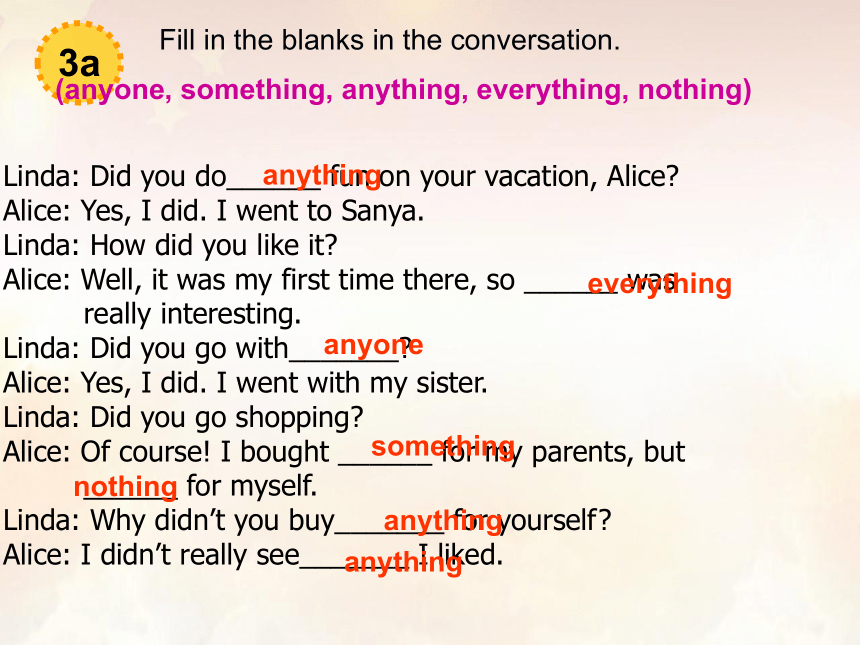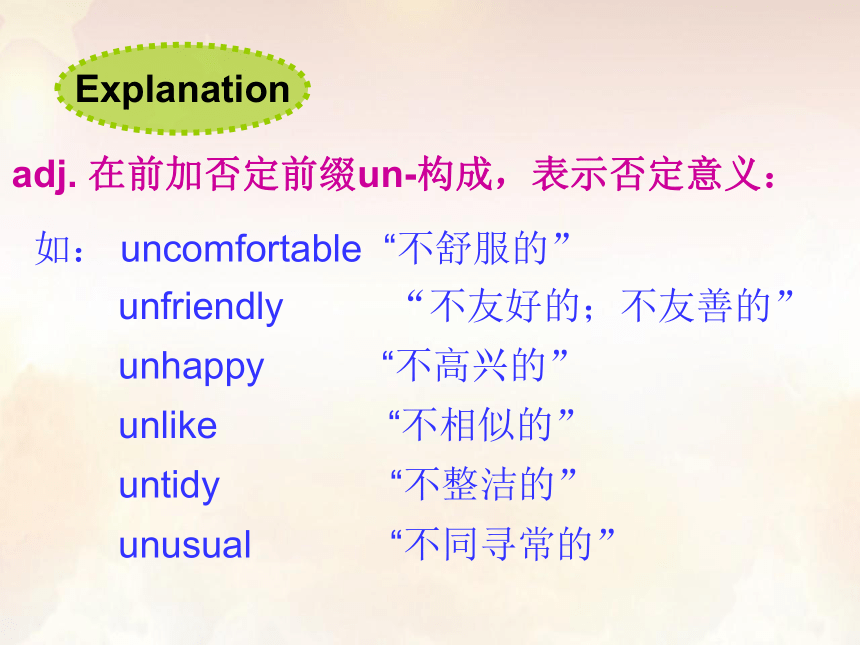Unit 1 Where did you go on vacation Section A (Period 2)(课件)(共13张PPT)-2024-2025学年 人教新目标GO For It 英
文档属性
| 名称 | Unit 1 Where did you go on vacation Section A (Period 2)(课件)(共13张PPT)-2024-2025学年 人教新目标GO For It 英 |  | |
| 格式 | ppt | ||
| 文件大小 | 3.7MB | ||
| 资源类型 | 教案 | ||
| 版本资源 | 人教新目标(Go for it)版 | ||
| 科目 | 英语 | ||
| 更新时间 | 2025-01-21 10:41:36 | ||
图片预览






文档简介
(共13张PPT)
Unit 1
where did you go on vacation
Period 2
Section A
1.学会谈论过去所发生的事件, 学习一般
过去时的用法
2. 学会谈论节假日的活动
教学目标
Where did you go on vacation?
I went to New York City.
Did you go out with anyone
No. No one was here. Everyone was on vacation.
Did you buy anything special
Yes, I bought something for my sister.
No, I bought nothing.
How was the food
Everything tasted really good!
Did everyone have a good time
Oh, yes. Everything was excellent.
3a
Fill in the blanks in the conversation.
Linda: Did you do______ fun on your vacation, Alice
Alice: Yes, I did. I went to Sanya.
Linda: How did you like it
Alice: Well, it was my first time there, so ______ was
really interesting.
Linda: Did you go with_______
Alice: Yes, I did. I went with my sister.
Linda: Did you go shopping
Alice: Of course! I bought ______ for my parents, but
______ for myself.
Linda: Why didn’t you buy_______ for yourself
Alice: I didn’t really see_______ I liked.
(anyone, something, anything, everything, nothing)
anything
everything
anyone
something
nothing
anything
anything
Explanation
how是疑问副词,表示“如何;怎样”。如:
—How was the weather there 那天气怎么样?
—It was sunny and hot. 天气晴朗,而且很热。
really good意为“非常好”,really在此处是副词,意为“颇; 相当; 非常”。
如:The old man felt really uncomfortable.
那个老人觉得很不舒服。
How was the food
Everything tasted really good.
Explanation
adj. 在前加否定前缀un-构成,表示否定意义:
如: uncomfortable “不舒服的”
unfriendly “不友好的;不友善的”
unhappy “不高兴的”
unlike “不相似的”
untidy “不整洁的”
unusual “不同寻常的”
Explanation
2、含 -body 和 -one 的复合代词只用来: 指人,
含 -thing 的复合不定代词只用来 : 指事物。
1、复合不定代词:
由some-,any-,no-,every- 加上 -one,-body,
-thing等所组成.
复合不定代词包括:
something, somebody, someone, anything, anybody, anyone, nothing, nobody, no one, everything, everybody, everyone 等。
4、含 some- 和 any- 的复合不定代词的用法区别:
A. something,someone,somebody: 用于肯定句
B. anything,anyone,anybody:
用于否定句,疑问句,条件状语从句中。
如: He found something strange but interesting.
他发现了一些奇怪但却有趣的事情。
Do you have anything to say ? 你有话要说吗?
I can’t meet anybody on the island.
在岛上,我没遇见任何人。
3、复合不定代词都具有单数的含义,通常被看成是单3式.
当它们充当句子的主语时,其后的谓语动词用单数形式。
如:Is everyone here today
今天,大家都到齐了吗?
Fill in the blanks in the e-mail message.
3b
Dear Bill,
How was your vacation Did you do______ interesting Did______ in the family go with you I went to a friend’s farm in the countryside with my family. ______ was great. We fed some hens and saw some baby pigs. They were so cute! The only problem was that there was_____ much to do in the evening but read. Still_____ seemed to be bored. Bye for now!
Mark
(anything, everything, nothing, everyone, no one)
anything
Everything
everyone
nothing
no one
名词所有格:表示 “ …的 ”
1、单数n.词尾加“ ’s ”,复数n.词尾若没有s,也加“ ’s ”。
例: a girl’s pen 一个女孩的钢笔
children’s room(s) 孩子们的房间
2、复数n.以s 结尾的词,直接加“ ’ ”。
例:students’ books 学生们的书
3、两个n.并列,分别有“ ’s ”,表示“ 分别有 ”。
例: Alice’s and Bob’s fathers (表示两人各自的爸爸)
4、两个n.并列,只有一个“ ’s ”,表示“ 共同有 ”。
例: Alice and Bob’s father (表示两人是同一个爸爸)
5、表示 无生命的n. 一般和of 构成短语。
例:a map of China 一幅中国地图
1、seem + adj. “看起来…”
例: You seem happy today.
你今天看起来很开心。
2、seem + to do… “似乎、好像做…”
例:I seem to have a cold.
我好像感冒了。
3、It seems / seemed + 从句 “看起来好像…”
例:It seems that no one likes you.
看起来好像没人喜欢你。
4、seem like + n. … “好像,似乎…”
例: It seems like a good idea.
这似乎是个好主意。
seem “ 看起来… ”
3C
Did you… Everyone Someone (write names) No one
eat anything at a restaurant
read anything interesting
visit anyone in your family
buy anything
keep a diary
Ask your group questions about their last vacation. Then tell the class your results.
谢谢观看
Unit 1
where did you go on vacation
Period 2
Section A
1.学会谈论过去所发生的事件, 学习一般
过去时的用法
2. 学会谈论节假日的活动
教学目标
Where did you go on vacation?
I went to New York City.
Did you go out with anyone
No. No one was here. Everyone was on vacation.
Did you buy anything special
Yes, I bought something for my sister.
No, I bought nothing.
How was the food
Everything tasted really good!
Did everyone have a good time
Oh, yes. Everything was excellent.
3a
Fill in the blanks in the conversation.
Linda: Did you do______ fun on your vacation, Alice
Alice: Yes, I did. I went to Sanya.
Linda: How did you like it
Alice: Well, it was my first time there, so ______ was
really interesting.
Linda: Did you go with_______
Alice: Yes, I did. I went with my sister.
Linda: Did you go shopping
Alice: Of course! I bought ______ for my parents, but
______ for myself.
Linda: Why didn’t you buy_______ for yourself
Alice: I didn’t really see_______ I liked.
(anyone, something, anything, everything, nothing)
anything
everything
anyone
something
nothing
anything
anything
Explanation
how是疑问副词,表示“如何;怎样”。如:
—How was the weather there 那天气怎么样?
—It was sunny and hot. 天气晴朗,而且很热。
really good意为“非常好”,really在此处是副词,意为“颇; 相当; 非常”。
如:The old man felt really uncomfortable.
那个老人觉得很不舒服。
How was the food
Everything tasted really good.
Explanation
adj. 在前加否定前缀un-构成,表示否定意义:
如: uncomfortable “不舒服的”
unfriendly “不友好的;不友善的”
unhappy “不高兴的”
unlike “不相似的”
untidy “不整洁的”
unusual “不同寻常的”
Explanation
2、含 -body 和 -one 的复合代词只用来: 指人,
含 -thing 的复合不定代词只用来 : 指事物。
1、复合不定代词:
由some-,any-,no-,every- 加上 -one,-body,
-thing等所组成.
复合不定代词包括:
something, somebody, someone, anything, anybody, anyone, nothing, nobody, no one, everything, everybody, everyone 等。
4、含 some- 和 any- 的复合不定代词的用法区别:
A. something,someone,somebody: 用于肯定句
B. anything,anyone,anybody:
用于否定句,疑问句,条件状语从句中。
如: He found something strange but interesting.
他发现了一些奇怪但却有趣的事情。
Do you have anything to say ? 你有话要说吗?
I can’t meet anybody on the island.
在岛上,我没遇见任何人。
3、复合不定代词都具有单数的含义,通常被看成是单3式.
当它们充当句子的主语时,其后的谓语动词用单数形式。
如:Is everyone here today
今天,大家都到齐了吗?
Fill in the blanks in the e-mail message.
3b
Dear Bill,
How was your vacation Did you do______ interesting Did______ in the family go with you I went to a friend’s farm in the countryside with my family. ______ was great. We fed some hens and saw some baby pigs. They were so cute! The only problem was that there was_____ much to do in the evening but read. Still_____ seemed to be bored. Bye for now!
Mark
(anything, everything, nothing, everyone, no one)
anything
Everything
everyone
nothing
no one
名词所有格:表示 “ …的 ”
1、单数n.词尾加“ ’s ”,复数n.词尾若没有s,也加“ ’s ”。
例: a girl’s pen 一个女孩的钢笔
children’s room(s) 孩子们的房间
2、复数n.以s 结尾的词,直接加“ ’ ”。
例:students’ books 学生们的书
3、两个n.并列,分别有“ ’s ”,表示“ 分别有 ”。
例: Alice’s and Bob’s fathers (表示两人各自的爸爸)
4、两个n.并列,只有一个“ ’s ”,表示“ 共同有 ”。
例: Alice and Bob’s father (表示两人是同一个爸爸)
5、表示 无生命的n. 一般和of 构成短语。
例:a map of China 一幅中国地图
1、seem + adj. “看起来…”
例: You seem happy today.
你今天看起来很开心。
2、seem + to do… “似乎、好像做…”
例:I seem to have a cold.
我好像感冒了。
3、It seems / seemed + 从句 “看起来好像…”
例:It seems that no one likes you.
看起来好像没人喜欢你。
4、seem like + n. … “好像,似乎…”
例: It seems like a good idea.
这似乎是个好主意。
seem “ 看起来… ”
3C
Did you… Everyone Someone (write names) No one
eat anything at a restaurant
read anything interesting
visit anyone in your family
buy anything
keep a diary
Ask your group questions about their last vacation. Then tell the class your results.
谢谢观看
同课章节目录
- Unit 1 Where did you go on vacation?
- Section A
- Section B
- Unit 2 How often do you exercise?
- Section A
- Section B
- Unit 3 I'm more outgoing than my sister.
- Section A
- Section B
- Unit 4 What's the best movie theater?
- Section A
- Section B
- Unit 5 Do you want to watch a game show?
- Section A
- Section B
- Unit 6 I'm going to study computer science.
- Section A
- Section B
- Unit 7 Will people have robots?
- Section A
- Section B
- Unit 8 How do you make a banana milk shake?
- Section A
- Section B
- Unit 9 Can you come to my party?
- Section A
- Section B
- Unit 10 If you go to the party, you'll have a grea
- Section A
- Section B
